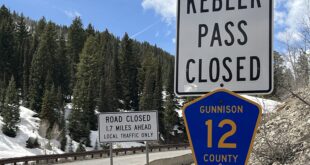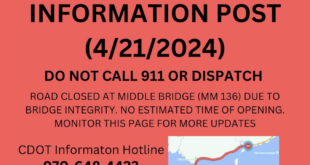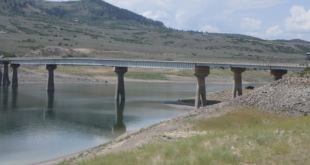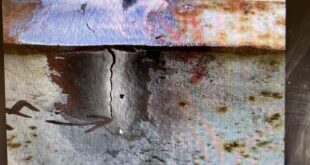“One of the most important things we can do is not put undue political influence on her decision making”
By Katherine Nettles
On Monday night’s KBUT question-and-answer session to discuss the latest public health orders, Gunnison County officials took heat on their hesitation to announce an official opening date for tourism, but reiterated that they are listening to the input from Gunnison County’s residents and making decisions on what they believe is right for the valley’s health and safety.
Officials also discussed economic efforts under way and how the Gunnison Valley can recover economically from the current crisis to become stronger and more resilient over time while balancing the health and safety of its inhabitants.
A panel made up of Joni Reynolds, Gunnison County Health and Human Services director; Jonathan Houck, chair of the Gunnison Board of County Commissioners; Cathie Pagano, One Valley Leadership Council (OVLC) member and Gunnison County director of Community Development; Darcie Perkins, assistant director for the ICELab at Western Colorado University and Industry Group Recovery coordinator fielded questions on a variety of topics related to the coronavirus.
Reynolds made several statements around the county’s Eighth Amended Public Health Order, the latest, issued on April 25 that allows certain types of businesses to re-open and activities to occur so long as they follow the order’s provisions to limit the spread of COVID-19.
As KBUT host Christopher Biddle noted, county officials have been getting some pressure from different industry groups to reopen. He asked Reynolds why massage parlors and tattoo shops were not allowed to reopen, for instance.
“The distinction there is around non-medical massage,” Reynolds said. She pointed out that most massages are considered medical, for stress reduction or other purposes.
Biddle asked if people advocating for their particular industries had helped get them back open, or if others who had not advocated as much, received less consideration. Reynolds said absolutely not.
“I have tried not to get distracted by the influencers,” she said. “And that’s been challenging… I wouldn’t say that one voice has been louder than another and I wouldn’t say that those have influenced me to make a decision.”
Biddle also asked Perkins about her sense of the business community’s feelings. She said she hasn’t conducted a survey, but in general senses that people are accepting.
“They might not have the answers they want yet, but they accept the decisions being made,” Perkins said.
Setting a timeline to reopen for tourism?
Gunnison Country Times editor Chris Rourke also joined the panel and asked several questions of her own. She pushed commissioner Houck repeatedly on the county’s reluctance to do what several other Colorado counties have done: Set a timeline for opening to tourism, namely through reopening lodging in the valley. This has been set tentatively as June 1 in other counties such as Chaffee.
“Why can’t a date be set to reopen and then as long as the conditions are met along the way we stick to that date?” Rourke asked.
Houck responded that he understands the desire for more definitive timelines and will consider this feedback from his constituents. But he said he thinks it’s premature to set those timelines, or “goals,” more than a month away, when progress is being measured in week-long increments and so much else is changing with the public health orders now.
Houck said under the state guidelines, “We had to have two weeks of a certain measure of not seeing a growth in [COVID-19] cases. And that allows us then to start moving into some next phases. And where are we going to be in two weeks from now, two weeks from then?
“I am not opposed, and Joni can weigh in on this as well, to setting some timelines with dates on them,” he continued. “But I think it’s important to turn back to the community and remind them if you set goals and if you set dates, the thing that gets you to those goals and those dates is doing the good work that the community has done.”
He referred to the openings happening this week, each triggered by reaching and maintaining public health measures.
“If we want to see that period go maybe four weeks instead of eight, that means we’re going to still limit our trips to the store. We are still going to practice social distancing. We’re still going to take those best practices we’ve been doing and not throw them out the window. Because the worst-case scenario for us is we get a spike that makes us take a few steps back.
“I know this is painful for people, but it’s where we’re at. We are working forward. It is not lost on us, we’re having a massive economic crisis right alongside our health crisis,” continued Houck.
He emphasized that Reynolds needs to have the clearance to make health decisions for the community during a health crisis, as a public health expert hired for her expertise in that field, and the commissioners defer to Reynolds on these decisions.
In the meantime, he said, the commissioners and other panelists are working on economic solutions, including federal, state and local participation, using the ICELab, OVLC, Region 10 and many others.
“But I think it’s important for people to understand, one of the most important things we can do is not put undue political influence on [Reynold’s] decision making. We need to give her the space, which we do, and she has our trust and our confidence,” he concluded.
Diversifying the business community
On that note, Pagano briefly outlined the ways that OVLC is focusing on a long-term resiliency project in response to the current situation, “building upon the work that we’ve already done during the One Valley Prosperity Project.” She said, “Many of the issues that were raised there that we’re working on currently were highlighted still as needing more work and more support.”
Pagano said one of those issues is internet infrastructure. “We are certainly seeing that internet service is an essential for our community members, for children who are home schooling, for people who are telecommuting right now. It is no longer an option, it is an essential service,” she said. The outages last week did not affect some of the major institutions, the county or the municipalities and OVLC is now working on building up more of those redundancies to reach more people, she said.
Biddle also asked about the OVLC’s efforts to help diversify the local economy. Pagano said one of the OVPP outcomes was to develop the ICELab.
“We’ve been very heavy in construction and tourism for a large number of years, and so the ICELab has really helped us to begin to diversify that and find other opportunities, whether it be manufacturing, distilleries and others that we can have better diversification in our economy and find resilience in these storms that we see. Whether it be a recession, 9/11, a pandemic, all sorts of things that we may never have contemplated,” answered Pagano.
Perkins added on behalf of the ICELab, “We’ve really shifted our focus in the last six weeks. We are very focused on recovery. We want to see every business that can survive this COVID-19 in our community to survive, and we’re putting full efforts into that.”
At the same time, Perkins said the incubator program has been running with three “really promising and sharp founders of new companies. They’re all local, they’re all local businesses. And that’s been going on through all of this. As much as recovery is taking a lot of our time, I know diversification is going to become part of this recovery process. And that will involve many of the programs we’ve been working on prior to this.”
Last, each panelist offered their reflections on the process so far.
Pagano said she has felt proud of Gunnison County residents and their overall response. “The thoughtfulness and the hard work and the dedication that I see … from all sorts of folks,” she said, is incredible. “I’m so happy to see the businesses start to reopen this week.”
Houck spent some time recognizing that the way the county communicated by postcard that second homeowners should not visit earlier this month was “horrible.” He made assurances that more care is being taken with communications, and that everyone is committed to more thoughtful language. He encouraged people to focus on positive ways to help and “make this community what it is.”
Houck continued, “There’s a lot of fault, but there’s an amazing amount of good things happening right now. I know it’s hard to see them as good things, but we’re rethinking ideas and business strategies and how we relate to each other. I think all of us, whether you’re home by yourself individually or with a family, you’re learning new dynamics of your life and how you communicate and connect.”
He reflected that the community is made up of full-time and part-time residents, second homeowners, university students, visitors and guests, and all care about the community.
To the business community, Houck said, “We all want to find success. We don’t want to lose businesses. We don’t want people to lose their life savings and their life’s work or to not make it through this,” he said. He asked everyone to think about how they can support businesses with the limited amount of commerce available, and to find new approaches.
Perkins asked that people trust the process.
“We would not be getting to this part of the process if we had not listened to what Joni has done,” she said.
 The Crested Butte News Serving the Gunnison Valley since 1999
The Crested Butte News Serving the Gunnison Valley since 1999





